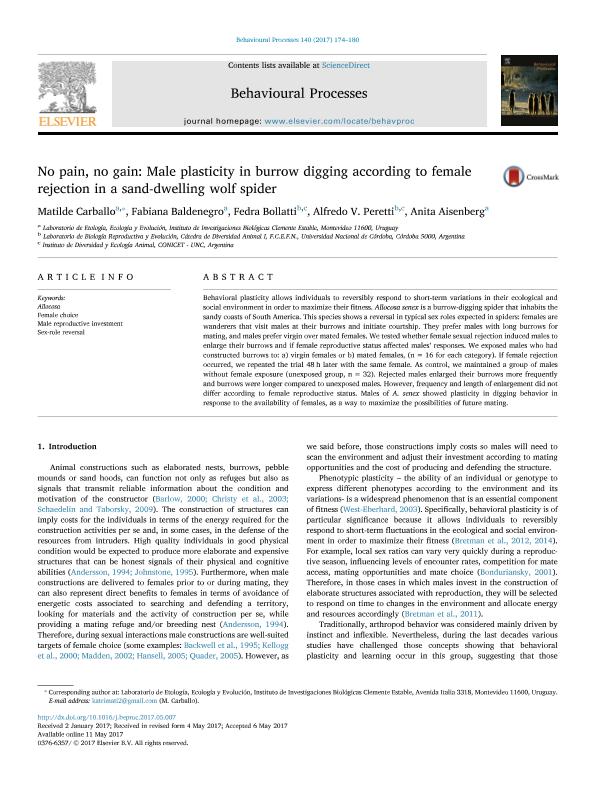Mostrar el registro sencillo del ítem
dc.contributor.author
Carballo, Matilde
dc.contributor.author
Baldenegro, Fabiana
dc.contributor.author
Bollatti, Fedra Ariana

dc.contributor.author
Peretti, Alfredo Vicente

dc.contributor.author
Aisenberg Olivera, Anita Diana

dc.date.available
2018-08-24T15:07:17Z
dc.date.issued
2017-07
dc.identifier.citation
Carballo, Matilde; Baldenegro, Fabiana; Bollatti, Fedra Ariana; Peretti, Alfredo Vicente; Aisenberg Olivera, Anita Diana; No pain, no gain: Male plasticity in burrow digging according to female rejection in a sand-dwelling wolf spider; Elsevier Science; Behavioural Processes; 140; 7-2017; 174-180
dc.identifier.issn
0376-6357
dc.identifier.uri
http://hdl.handle.net/11336/56947
dc.description.abstract
Behavioral plasticity allows individuals to reversibly respond to short-term variations in their ecological and social environment in order to maximize their fitness. Allocosa senex is a burrow-digging spider that inhabits the sandy coasts of South America. This species shows a reversal in typical sex roles expected in spiders: females are wanderers that visit males at their burrows and initiate courtship. They prefer males with long burrows for mating, and males prefer virgin over mated females. We tested whether female sexual rejection induced males to enlarge their burrows and if female reproductive status affected males’ responses. We exposed males who had constructed burrows to: a) virgin females or b) mated females, (n = 16 for each category). If female rejection occurred, we repeated the trial 48 h later with the same female. As control, we maintained a group of males without female exposure (unexposed group, n = 32). Rejected males enlarged their burrows more frequently and burrows were longer compared to unexposed males. However, frequency and length of enlargement did not differ according to female reproductive status. Males of A. senex showed plasticity in digging behavior in response to the availability of females, as a way to maximize the possibilities of future mating.
dc.format
application/pdf
dc.language.iso
eng
dc.publisher
Elsevier Science

dc.rights
info:eu-repo/semantics/openAccess
dc.rights.uri
https://creativecommons.org/licenses/by-nc-sa/2.5/ar/
dc.subject
Allocosa
dc.subject
Female Choice
dc.subject
Male Reproductive Investment
dc.subject
Sex-Role Reversal
dc.subject.classification
Otras Ciencias Biológicas

dc.subject.classification
Ciencias Biológicas

dc.subject.classification
CIENCIAS NATURALES Y EXACTAS

dc.title
No pain, no gain: Male plasticity in burrow digging according to female rejection in a sand-dwelling wolf spider
dc.type
info:eu-repo/semantics/article
dc.type
info:ar-repo/semantics/artículo
dc.type
info:eu-repo/semantics/publishedVersion
dc.date.updated
2018-08-17T14:32:10Z
dc.journal.volume
140
dc.journal.pagination
174-180
dc.journal.pais
Países Bajos

dc.journal.ciudad
Amsterdam
dc.description.fil
Fil: Carballo, Matilde. Instituto de Investigaciones Biológicas "Clemente Estable"; Uruguay
dc.description.fil
Fil: Baldenegro, Fabiana. Instituto de Investigaciones Biológicas "Clemente Estable"; Uruguay
dc.description.fil
Fil: Bollatti, Fedra Ariana. Consejo Nacional de Investigaciones Científicas y Técnicas. Centro Científico Tecnológico Conicet - Córdoba. Instituto de Diversidad y Ecología Animal. Universidad Nacional de Córdoba. Facultad de Ciencias Exactas Físicas y Naturales. Instituto de Diversidad y Ecología Animal; Argentina
dc.description.fil
Fil: Peretti, Alfredo Vicente. Consejo Nacional de Investigaciones Científicas y Técnicas. Centro Científico Tecnológico Conicet - Córdoba. Instituto de Diversidad y Ecología Animal. Universidad Nacional de Córdoba. Facultad de Ciencias Exactas Físicas y Naturales. Instituto de Diversidad y Ecología Animal; Argentina
dc.description.fil
Fil: Aisenberg Olivera, Anita Diana. Instituto de Investigaciones Biológicas "Clemente Estable"; Uruguay
dc.journal.title
Behavioural Processes

dc.relation.alternativeid
info:eu-repo/semantics/altIdentifier/doi/http://dx.doi.org/10.1016/j.beproc.2017.05.007
dc.relation.alternativeid
info:eu-repo/semantics/altIdentifier/url/https://www.sciencedirect.com/science/article/pii/S0376635717300037
Archivos asociados
